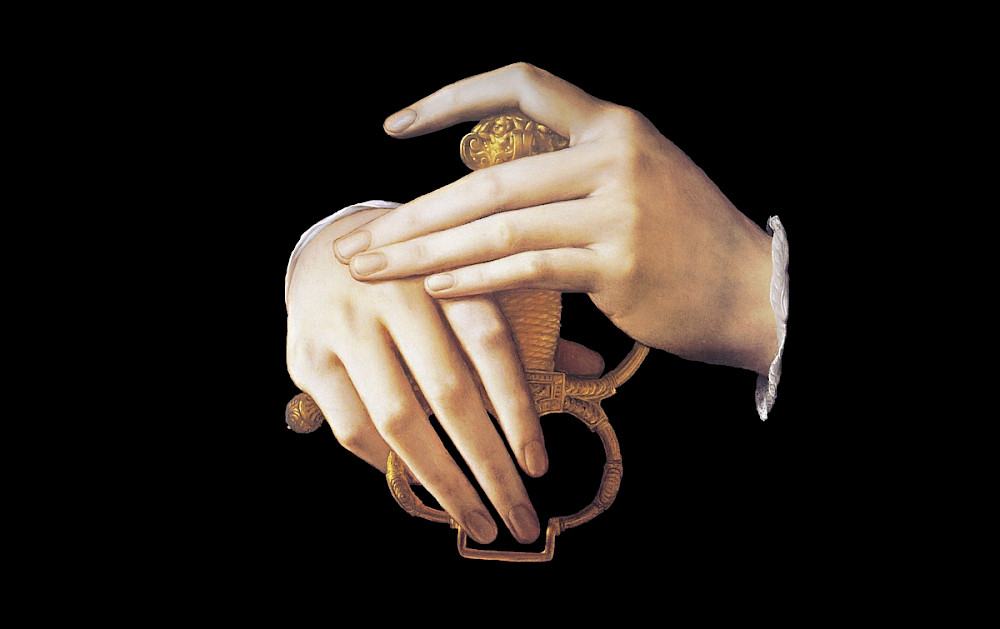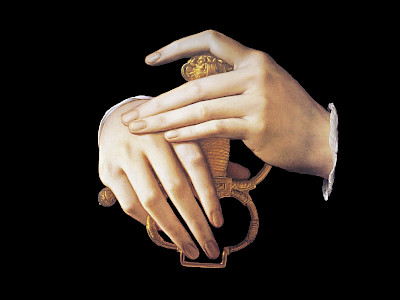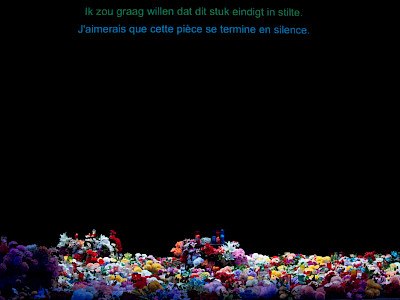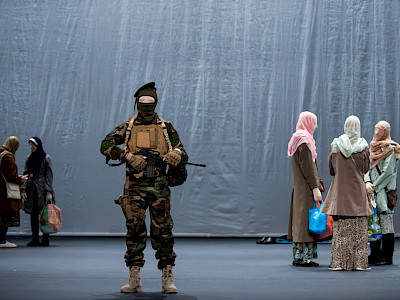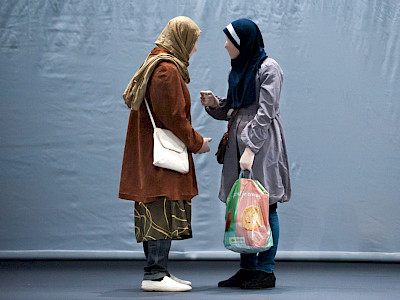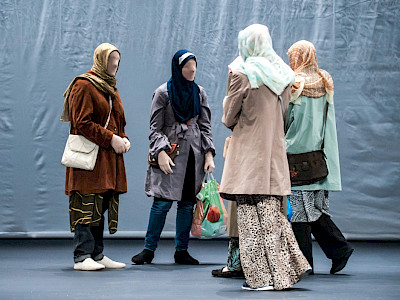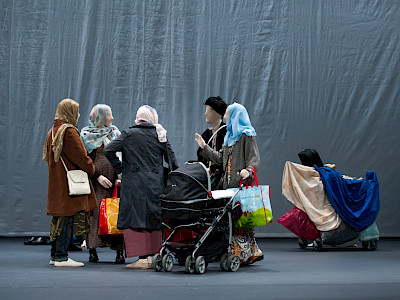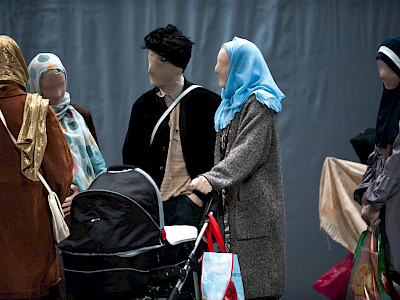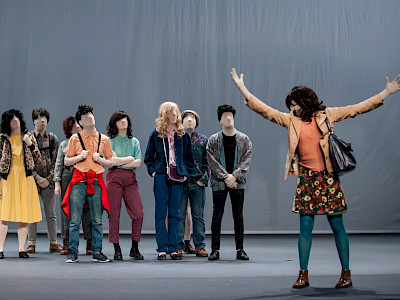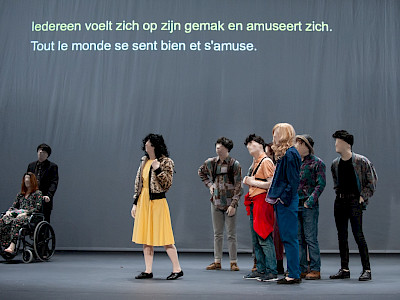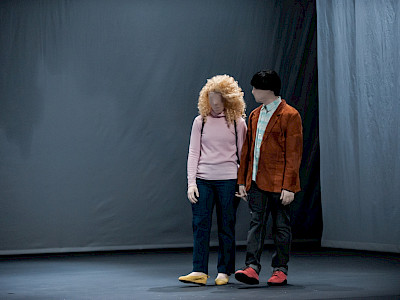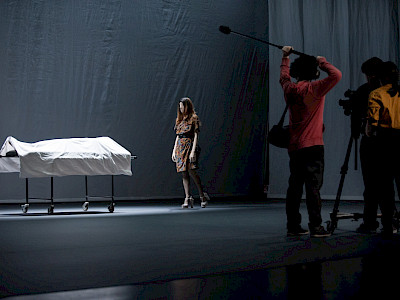05.05, 06.05, 08.05, 09.05.2018
El Conde de Torrefiel Barcelona
LA PLAZA
theatre — premiere
Spanish → NL, FR | ⧖ ±1h30 | € 18 / € 15 (-25/65+) | Meet the artists after the performance on 6/05
Visceral, brilliant and unconventional, there is no doubt that the theatre of El Conde de Torrefiel has been one of the great revelations in recent years. For three festivals now, the collective from Barcelona has won over audiences with a stage device of impressive visual and philosophical potential. Its plays reveal a succession of tableaux vivants above which words of incredible lucidity flow past. Out of this gap between image and meaning comes the underground violence of our contemporary way of life. In their new creation, which is having its world premiere at the Kunstenfestivaldesarts, El Conde de Torrefiel envisages the stage as a public space where unforeseeable events succeed one other: the “future”. Thus LA PLAZA offers a breath-taking journey between the infinitely small and the infinitely large through a space-time that puts the laws of physics to the test and allows us to look at our era from another dimension. A profoundly disturbing cosmic and speculative movement and definitely one of the highlights of the festival!
See also
Texts by Pablo Gisbert (El Conde de Torrefiel) are published in French by Actualités Editions: Pablo Gisbert, La possibilité qui disparaît face au paysage followed by Guérilla; translation by Marion Cousin
Aside from the simple need for self-expression, what is your intention when creating an artistic object to offer to a varied audience, gathered in your case from a number of different countries? Are you thinking about a single individual, as Stephen King recommends, saying that as he cannot please everyone, he only thinks about addressing his wife, the first person to whom he gives his books to read?
Tanya Beyeler This is something that comes in time. Because when we started to make pieces, we thought a lot about the audience, but less so now. It’s not that the audience is irrelevant, it’s because I can’t control it. Once you understand that, you stop being so worried about what they are going to think. All you have to worry about is opening up channels of communication. I can work on making sure that everything that is done and said is perfectly understood. But how it affects an audience, how they receive it and process it, that’s something personal to them. And I don’t control that.
What is your intention when you’re creating something to share? And where are you now? What is your intention now?
TB We are still in chaos. For me, speaking as Tanya, the focus is very much on the idea of the future as present. The future is being decided now. Given how things are now, what are the consequences? Thinking on a wider scale, thinking in terms of legacy, planning. Not so much a personal present, but about where all this is taking us, what are the consequences of what is happening. The atmosphere is strange, uneasy, where will it end? Who is planning our future? The future only exists in the present. The future is not an utopia, it is something planned, and it is being planned in the present. There are plans that are currently taking shape, and are we aware of this? With GUERILLA you refined your tools, and you seemed to have completed a cycle. Are you now going to look for what isn’t working, as Pablo commented when we were talking some months ago?
TB We are looking for other ways. We are in a process where we have started completely from scratch. It also corresponds to life phase we are in at the moment. We include the familiar planning (Tanya and Pablo just had a child) in our creative planning. We have to think and plan ahead now. We have to do this.
Pablo Gisbert It is also really important to trust other people. The idea of coming together and working with people. Just the process of choosing the people, is a form of creation. It means that you don’t choose everyone, but only a dozen people. Once you’ve chosen them, you’ve divided the world: “You and us, let’s work together”. For me, trusting the other artists is liberating. The idea of truly being able to work with others’ creativity is a huge step to take. For the pieces we are presenting at the Arts Santa Mònica and the Festival SÂLMON< in Barcelona, all the texts are theirs. And this, for me as writer, means trusting the creativity of another mind.
Some people have told me that, compared to GUERRILLA, where they saw huge violence, in The natural histories (an early version of LA PLAZA) the violence is latent. Perhaps in your case this radicalises the discourse?
TB The world and my surroundings stimulate me all the time. And it means I am constantly questioning. But that’s my problem, everyone deals with this differently, but for me it is stimulating. People, comments and opinions, everything stimulates me. And attacks me and violates me. In the piece, at a particular point, Andy Warhol is mentioned and how his creative process consisted of observing the world and showing it the way it is. This aggression, which I perceive and experience, this continuous stimulation by people, it affects me. And I show it. There is a particular trend on Facebook: I see like-minded people and comments related to me. But the world is not like this. How do we position ourselves? I am wrestling with other realities all the time, and this is how I construct myself as a person. It goes further than what I think, what I am, what I create. Deep down, I am the sum of my very tiny will, of my beliefs, or whatever you’d like to call it, added to everything else, which makes up 90% of who I am.
PG Warhol, when he is putting a burger, or a can of Coca-Cola or Marilyn Monroe in front of you, he is showing you what you desire. He is putting this object in your face, simplified and reduced, and telling you: look, this is what you desire. We were all living around this burger, around Marilyn Monroe – today it’s Kim Kardashian. We are living around these icons we desire, all of us, all of the time. And one of the most amusing things I have recently noticed is that all of us living in this Western world, turning our backs to Communism, in the end we are communists. We are all listening to the same music, wearing the same clothes, eating the same food, talking about the same books, living in the same cities, with the same topics of conversation, the same way of speaking, watching the same films… We are ultra-communists. We are so neo-liberal that we are communists, ultra-communists. But it’s capitalism that brought us here. It is a very strange thing, very strange.
PG Life teaches you that you cannot reduce everything to one present. You have to lift your gaze, rise a little above the simple present moment. This makes you see the familiar, working life, married or artistic life, not as today, but as a curve in time. Lately I am looking at all artistic creations as the pieces of a whole. This way you see what the artist was thinking in 2016, when he or she is making another piece in 2018. And this provides insights. It’s like Rothko. At first he used colours, and a few months before he committed suicide, he was painting only with shades of black. Now, looking back, you can see how Rothko gets to the point of killing himself. Because you see how his work which began with colour, gradually shifted to shades of violet, dark colours and in the end, just before he committed suicide, only consists of shades of black. In the end, art is nothing more than an emotional desire to understand the other person. Art is not intellectual, it is emotion.
You now have to get ready for the premiere of LA PLAZA. You have already done four episodes of M.C. In fact, what does M.C. mean?
TB M.C. is the name of the project. Just like GUERRILLA, which began with a meeting at Espai Nyamnyam in Barcelona and finished with the work we premiered at Kunstenfestivaldesarts in 2016, we have now started the M.C. project. We made an early version in Athens, then another one at the
Museo de Arte Reina Sofía in May, at the Arts Santa Mònica and now one during Sâlmon. This all embracing process suits our artistic work. We now have a premiere, a co-production, going on tour. We have to respond to these dynamics. But that doesn’t mean we have to go straight to the end
result. That’s why we carry out an investigative project, and present these fragments to the audience. The title LA PLAZA (the square) again refers to this idea of a public space, where public topics are dealt with and where all these public contradictions are found. That’s why we chose this title. And that’s why we are addressing topics which, deep down, affect all of us in various ways. And we can’t control that. This is what we want to bring to the table, what we want to present on stage, which in fact is like a plaza, a public square, where things are presented and displayed.
Is there anything more you’d like to add to this interview?
PG Yesterday, at half past three in the morning, stuck in a car, a friend said something, and I thought: that’s true what you just said. He said: on the issue of Catalonian independence, I am capable of changing my mind three times in one day. Because you are overwhelmed by emotions, by perceptions and the chaos is so big you can’t position yourself. So you change your mind three times a day. It all depends on who you’re talking to, on this plaza where we live. Depending on the café where you drink your coffee, on the bar you are going to, on whoever sells you a newspaper, on which friends you smoke a cigarette with, you have a beer with, you’re changing your opinion all the time. And it’s total schizophrenia. I think LA PLAZA will be different from our previous works, because we are going to write about things we don’t agree with. I let go of my responsibilities. Everything I write, I can deny. And it seems liberating to me. As artists we are not politicians or priests. We do not have to indoctrinate anyone. We do not have the truth. Of all the professions in the world, we are the only ones able to say that what we do is lying. There is no politician who says: I am lying. There is no priest who says in a Mass: God is lying. But we artists can do that, and this is liberating. LA PLAZA will be a piece in which I don’t take responsibility for any of the subjects it talks about, just as we would do for all the people around us. All bars, all environments, all social classes, all ethnicities and languages, speak in a different way.
Is art a game? Do you see it as a game, and are you also not responsible for this?
TB I guess not. It’s about personal taste. I want it in a certain way, and that’s how I do it. And some people will like it and others won’t. But it’s my game. Because in the end we are the people who devote so much time to it. If we are only thinking about who is receiving it, it wouldn’t work. Because if you spend so much time working on this, it has to be something you enjoy doing, which amuses you. And afterwards, I guess, everyone is free to receive it as good or bad.
PG You have to realise that all art, everything human beings create, whether art, music, religion, everything is an aesthetic experience. Isn’t going to Mass an aesthetic experience? Songs, texts, lights, smells, vestments, rituals, poetry, heaven and hell, love… Isn’t all this an aesthetic pleasure in itself? What isn’t an aesthetic experience? A football match, with hymns, songs, colours, movements, team strip, lights, choreography, that’s an aesthetic experience. People seek to escape from their own bodies because it’s not enough. Football, art, religion, it’s all comparable. It’s about seeking gods everywhere, and above all, we are trying to get outside ourselves, lifting ourselves up, whether it’s with football, art or religion, because we do not tolerate our own simplicity.
TB I want to add something else. Everyone is talking about the idea of freedom of speech. But we can look at this idea from different angles. Freedom of expression means you can say anything, including things that aren’t good, or are not within the general interest. LA PLAZA, the square, is the place for conversation. We are all free to say what we want, but sometimes we say what we want without really thinking about the consequences, without thinking ahead and we say terrible things. Freedom of speech also allows that: saying terrible things. And that’s just what it’s full of. Watch TV, read the papers, listen out in the street, many terrible things are said. This too is freedom of speech. What do we do with this? What do we do with this democratic idea of freedom of speech; this idea of anything is possible? Everyone is free to do what they want. It’s the big social question. Where does your freedom start and mine end, and vice versa? Freedom of speech is not only for the right-minded people. It also allows people like Trump or Le Pen to say what they say, and be free to say it. And there are many people who support them, and they feel encouraged. It is a very reductionist approach to limit oneself only to the good, to the politically-correct. What is the world like? I have to go beyond my limits and my set of beliefs. It’s an exercise in taking ownership. My personal opinion, what I believe, means absolutely nothing, has no weight. And it goes much further. I alone will not change the world. That’s it. That’s all I have to say.
Extract from the interview with El Conde de Torrefiel in Barcelona, by Rubén Ramos Nogueira, published on 22/02/18 in TEATRON, website for the performing arts.
Translation: Joanna Waller
Conceived & devised by El Conde de Torrefiel, in collaboration with the performers
Direction Tanya Beyeler & Pablo Gisbert
Text Pablo Gisbert
Cast Gloria March Chulvi, Albert Pérez Hidalgo, Mónica Almirall Batet, Nicolas Carbajal, Amaranta Velarde, David Mallols & locals
Stage Design El Conde de Torrefiel & Blanca Añón
Props & Costumes Blanca Añón & performers
Light design Ana Rovira
Sound design Adolfo Fernández García
Stage manager Isaac Torres
Presentation Kunstenfestivaldesarts, Kaaitheater
Production Kunstenfestivaldesarts, El Conde de Torrefiel
Coproduction Alkantara & Maria Matos Teatro Municipal (Lisbon), Black Box Teater (Oslo), Centre Georges Pompidou – Les Spectacles Vivants & Festival d’Automne à Paris, Festival GREC (Barcelona), Festival de Marseille, HAU Hebbel am Ufer (Berlin), Künstlerhaus Mousonturm Frankfurt am Main, FOG Triennale Milano Performing Arts, Vooruit (Ghent), Wiener Festwochen (Vienna), Zürcher Theater Spektakel (Zurich)
With the support of Zinnema (Brussels), Festival SÂLMON, Mercat de les Flors & El Graner – centre de creació (Barcelona), Fabra i Coats, centre de creació Barcelona
Diffusion & tour management Caravan Production
Subtitling with the support of ONDA
Thanks to the Embassy of Spain in Belgium | Spain Arts & Culture Belgium
